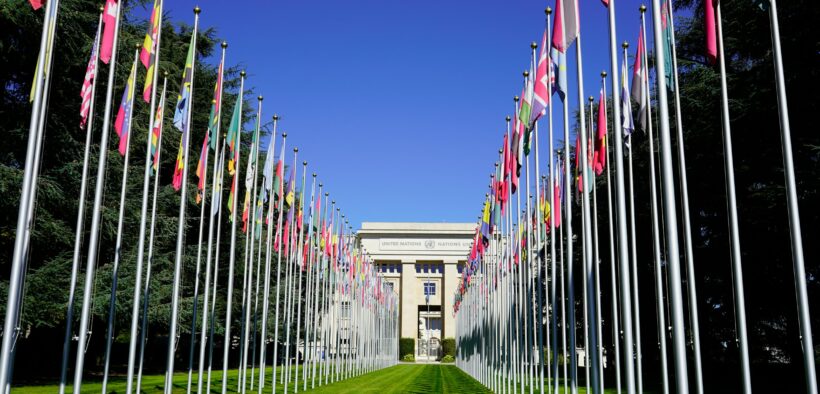Impunity Gaps and Loopholes: The United States and International Justice
Share

Image Credits: @meizhilang on Unsplash (Unsplash License)
International justice is the concept of ensuring accountability through fair trials for serious crimes. The International Criminal Court (ICC), established in 2002, is the only international court with the jurisdiction to investigate and prosecute individuals suspected of committing the “gravest crimes of concern to the international community.” The ICC is governed by the Rome Statute, which limits the court’s jurisdiction to four core international crimes—crimes of genocide, crimes against humanity, war crimes, and crimes of aggression. Outside of the ICC, hybrid tribunals and ad hoc courts are mechanisms of international justice that can be established to investigate and prosecute large-scale crimes under international law. The Geneva Conventions, the core of international humanitarian law, legally obligates all state parties to enact domestic legislation providing for the persecution of suspected perpetrators of war crimes. The conventions provide universal jurisdiction to sanctioning countries to exercise legal authority over accused individuals. Universal jurisdiction occurs when a state claims criminal jurisdiction over an accused person, regardless of where the crime occurred and the accused’s nationality.
International Criminal Law in the United States
While the United States is party to the Geneva Conventions, it is not a state party to the Rome Statute or other conventions regarding international crimes. The ICC, therefore, only has jurisdiction over US citizens if an individual commits one of the four grave crimes within the territory of a state party to the ICC.
Accountability for international war crimes in the U.S. is primarily inhibited by the lack of robust domestic legislation. In 2023, President Biden signed the Justice for Victims of War Crimes Act, amending the 1996 War Crimes Act to guarantee that U.S. courts can prosecute perpetrators of war crimes who are present in the U.S., regardless of the perpetrator’s nationality or where the crime took place. The previous law established that criminal procedures required victims of war crimes to be members of the U.S. armed forces or U.S. citizens. Consequently, until 2023, the United States never fully complied with its obligations regarding war crimes under the Geneva Conventions. However, there is no legal framework for holding perpetrators accountable for crimes against humanity in the U.S., creating impunity gaps and loopholes that prohibit the pursuit of international justice. By failing to adequately respond to the crime, the United States further fails to uphold its Geneva Convention obligations.
War Crime Legislation
According to the Rome Statute, war crimes are grave breaches of any person or property protections in the Geneva Conventions, serious violations of laws and customs of international armed conflict, and other serious violations of laws and customs applicable in non-international armed conflicts within the framework of international law. Most notably, war crimes can be torture or inhumane treatment, extensive destruction of property, depriving persons of the right to fair and regular trial, taking of hostages, and unlawful deportation, transfer, or confinement.
The Justice for Victims of War Crimes Act defines war crimes as grave breaches of the Geneva Conventions. Additionally, the definition includes violations regarding the siege and bombardment of civilian towns and cities from the Annex to the 1907 Hague Convention IV, Regulations 23, 25, 27, and 28, and willful killing prohibited in Protocol II to the Convention on Certain Conventional Weapons on Prohibitions or Restrictions on the Use of Mines, Booby-Traps and Other Devices. The Act did not expand its definition from the previous law, and the U.S. definition of war crimes is considerably narrower than the Rome Statute’s definition.
The Act’s biggest changes include removing statutes of limitations and allowing the U.S. to exercise universal jurisdiction. However, universal jurisdiction can only be applied if the perpetrator is present within the country. The Act stipulates written authorization from the Attorney General, Deputy Attorney General or Assistant Attorney General for war crime prosecution to proceed. The Act is not a revolutionary law of war crimes protection, it simply brings the U.S. closer to international law standards.
Crimes Against Humanity Legislation
The United States does not have any current legislation that takes measures to hold crimes against humanity accountable. In 2009, Illinois Senator Dick Durbin introduced the Crimes Against Humanity Act of 2010, which would amend the federal criminal code to allow the imposition of fines and prison terms on any person violating federal criminal laws that align with international legal protections against grave crimes. Additionally, it would provide jurisdiction if the offender is a U.S. national or resident or the offense is committed in whole or in part within the U.S. While the bill aligns with the United States’ obligations under the Geneva Conventions and international criminal law in whole, the bill never moved past the introduction stage. The U.S. government does not currently have any legal authority to prosecute perpetrators of crimes against humanity, even if the perpetrators are within the country.
A crime against humanity, according to the Rome Statute, is an act knowingly committed as part of a widespread or systematic attack against any civilian population. There must be a physical, contextual, and mental element. Most prominently, but not exclusively, acts can include extermination, enslavement, sexual violence, imprisonment, forcible transfer, and torture. A crime against humanity does not need to occur in a conflict or war, meaning that the U.S.’s lack of legislation represents a shortcoming in its ability to pursue justice.
Prosecutors often resort to immigration violations with involvement in crimes against humanity as the basis of the fraud allegations and evidence. For example, in 2018, Liberian warlord Mohammed Jabbateh, who was living in East Lansdowne, Pennsylvania, was convicted on two counts of immigration fraud and two counts of perjury and sentenced to 30 years in prison. Homeland Security investigators and Philadelphian attorneys made 10 trips to Liberia to fly in witnesses. The witnesses testified tales of child soldiers, public rape, torture, murder, and other inhumane acts. While prosecutors may have been able to hold Jabbateh accountable for his crimes under the Justice for Victims of War Crimes Act if it came six years earlier, the case represents only one of many where perpetrators of crimes against humanity received impunity in the United States for their atrocious crimes.
Genocide and Torture Legislation
U.S. Code Section 1091 of Title 18 prohibits genocide in times of peace and war. The law defines genocide as the specific intent to destroy, in whole or in part, a religious, national, or ethnic group through murder, bodily injury, permanent impairment of mental faculties, inhumane conditions of life, prevention of birth, and forcible transfer of children. The U.S.’s jurisdiction extends to offenses committed within the U.S. or if the offender is a national of the U.S. The U.S. definition aligns exactly with the Rome Statute’s definition of genocide. However, the United States is not party to the Convention on the Prevention and Punishment of the Crime of Genocide, which calls on state parties to take measures to prevent and punish the crime of genocide.
The Torture Victim Protection Act of 1991 prohibits torture committed by public officials under color of law against persons within the official’s custody or control. Torture is defined to include all acts intended to inflict severe physical or mental pain or suffering, which aligns with the Rome Statue definition. However, the statute applies only to acts of torture committed outside of the U.S., and the U.S. has jurisdiction when the perpetrator is a U.S. national or residing in the U.S. The torture statute has been used to pursue accountability in the U.S. The Act has successfully been used to pursue accountability and convict one perpetrator. The U.S. is not party to the Convention against Torture and Other Cruel, Inhuman or Degrading Treatment or Punishment, which called its state parties to prevent and persecute acts of torture.
Conclusion: Dangers of American Impunity in Ongoing Conflicts and Wars
The loopholes and shortcomings in U.S. legislation regarding crimes against humanity, full war crime accountability, and the prevention of torture and genocide leave the United States unprepared to deal with atrocities in ongoing conflicts, including those in Ukraine and Palestine. If perpetrators manage to escape to the United States, they will likely avoid accountability for atrocious crimes. The U.S. has the resources to take steps towards preventing crimes such as genocide and torture, yet their refusal to join such conventions signals to the world a disregard for accountability of international crimes. Moreover, the U.S.’s refusal to join the ICC means that U.S. nationals complicit in wars and conflicts across the globe may receive impunity for their actions.
The United States lags in its enforcement of international justice, which leads to implications for the larger system of international law as a whole. If one of the foremost global leaders does not equally protect war crimes, crimes against humanity, crimes of genocide, and crimes of aggression, why should other countries? It is essential that the United States begins taking steps to fill the loopholes and gaps in its legislation against international crimes. The United States has little to lose and a lot to gain—correcting these flaws in the legal system will strengthen U.S. credibility and security, both domestically and internationally. It would also strengthen the ability of the government to deliver justice to victims of heinous crimes.
The United States must take steps to continue amending its legal system to ensure that it provides full protection of victims and accountability to perpetrators of international crimes. It can begin by ratifying Durbin’s Crimes Against Humanity Act of 2010 and continue expanding the protections under the Justice for Victims of War Crimes Act. Additionally, it should become party to the Convention on the Prevention and Punishment of the Crime of Genocide and the Convention against Torture and Other Cruel, Inhuman or Degrading Treatment or Punishment to ensure that the U.S. takes steps towards preventing the crimes and has jurisdiction to prosecute acts committed against U.S. nationals outside of the United States. One of the most essential steps that the U.S. must take is ratifying the Rome Statute and becoming a party to the ICC.
It is crucial that the United States begins to prioritize accountability efforts. As international armed conflicts become more prevalent across the globe, the United States needs to be prepared to participate in the prosecution of atrocious crimes. Moreover, if evidence appears that U.S. nationals or officials are complicit in crimes occurring during ongoing crimes, it is essential that there are methods to hold perpetrators accountable. Impunity risks the entire foundation of international law, and the United States must take steps to ensure international justice is served.


Want to get involved?
Connect with us! Connect with us!